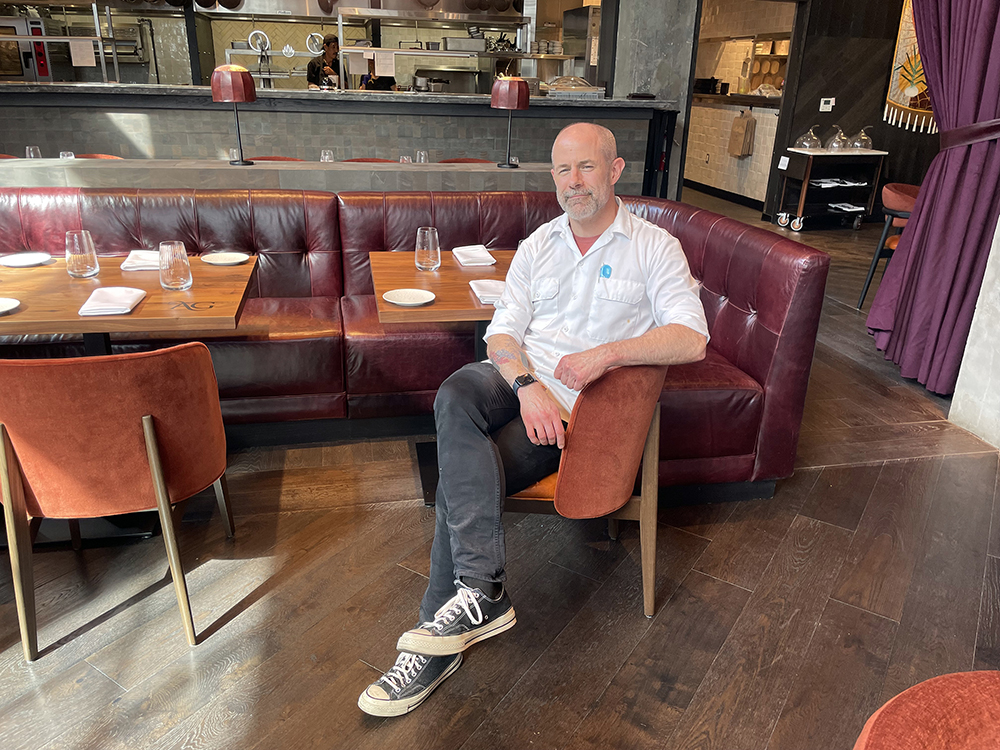Nate Henssler describes his duck selection on Amelia Gene’s menu as “a tribute to one of my heroes — Julia Child.”
Henssler, who is executive chef at Amelia Gene’s restaurant adjacent to the Caption by Hyatt Beale Street Memphis Hotel at 255 South Front Street, grew up in New Hampshire watching the legendary chef ’s TV show. “I was watching Julia Child, The French Chef, maybe because my parents watched it a little bit. I thought her voice was funny. And she just seemed like a grandmother type.”
And, he says, “She was always very curious. And you could feel the love — or see it —when she cooked. It was very approachable.”
Henssler, who describes Amelia Gene’s as “a modern American chef-driven restaurant,” says, “Duck is something we’re having on the menu probably all the time.”
His crispy duck dish, which he calls “a play on duck à l’orange,” takes five days to produce. “The legs we cure in a salt and sugar mix with soy spices. And we cure that for a day, cooking it in its own fat. Confit. It’s a technique. This dish is not something I made up. I like these techniques, and it makes the duck taste really good.”
The dish includes butter, garlic, shallots, and Belgian endive. “It’s served with the same sauce we make from the duck bones with orange purée and kumquats preserved in honey.”
Rather than do a seasonal menu change, Henssler plans to just scale back the menu. “It’s hard on the staff to do a seasonal menu change.”
In addition to the duck, Henssler says his blackberry oysters with cauliflower soubise, pickled cucumber, and bay leaf will remain on the menu. “It’s based on an oyster I ate when my wife and I were in London over Christmas. A tweak on that.”
His charred octopus salad with mustard greens and salted lemon dressing is another one. “The octopus is a super simple dish. I cook it really slowly. The octopus takes about eight hours. It’s slowly braised in white wine.”
He uses the bones from the black bass on the menu to make a fish stock. “Reduce that down. And we purée salted lemon and lemon oil in that. It comes out like a warm mayonnaise.”
As a child, both Henssler’s parents worked. His mother was a “day-to-day cook. A lot of casseroles. Early ’80s American food. Crock pot food. A lot of leftovers. It seemed like we had leftovers every night, actually.”
His dad, who was known for his spaghetti, would cook the sauce all day.
But, Henssler says, “My parents didn’t use a lot of salt or pepper when they cooked.”
He recalled tasting food at his first restaurant job and “realizing how alive everything tasted with just a pinch of salt.”
Henssler’s first “paying job” was working as a baker’s assistant. The bakery owner knew he was interested in food, so she let him “do some prep work in the bakery. Forming dough.”
He then got a job as garde manger at the Bedford Village Inn. His boss, chef Christopher Ward, noticed Henssler’s interest in cooking. “He pushed me to get off that station and move up to the next station.”
When he was 18, Henssler enrolled at the New England Culinary Institute, where he got to work with the school’s founder, Michel LeBorgne. “Some of the chefs at the culinary school seemed like such badasses. The men and women teaching us. We idolized them.”
Henssler, who has worked at top restaurants in Las Vegas and Chicago, moved to Memphis a year ago. He’s also a managing partner in the Carlisle Restaurant Group. “I think Memphis diners are ready to sort of experience what diners in Chicago or New York are experiencing. We need a restaurant that could compete in any city.”
Describing his “contemporary American chef-driven” cuisine, Henssler says, “This is what I feel like cooking. If something is in season and the purveyor has this for the next two months, we’ll come up with a really good dish. And do as little to those ingredients as we can so we can showcase that ingredient.”
